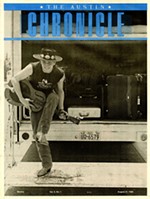AI by Any Other Name
Austin Interfaith is moving toward a broader, Central Texas future
By Lee Nichols, Fri., Oct. 19, 2007
The multi-issue coalition of congregations, schools, unions, and other institutions – a local affiliate of the state and nationwide Industrial Areas Foundation – isn't going away; it's reinventing itself. The idea, says AI executive committee member Minerva Camarena Skeith, is for the organization to transform itself over the next two years in a way that reflects the Austin region's recent explosion from a relatively small city into a major metropolitan area and to tackle the attendant problems that mushroom with such growth. And by the end of that revisioning process, they expect they'll also come up with a new name to reflect the transformation.
"The leaders of the organization were talking about the effectiveness we have had and what we were accomplishing as we were, but recognizing that the city and the county were growing at a very fast pace, and in order for us to continue to have that kind of success, we needed to get bigger and more countywide," Skeith says.
Just focusing on inner-city Austin would no longer be enough, they recognized; they'd have to reach out to the whole region. Travis County's poverty rate is 16%, higher than the national 13%; a quarter of the county's residents (about 200,000 people) have no health insurance; and the median household income in Travis has decreased 12% since 1999, when adjusted for inflation. "We've been very Austin-based, but a lot of the growth has been outside Austin, particularly with the change in the price of housing. Lots of the members in our congregations ... they live in Manor, they live in Buda, they live in Pflugerville.
"It's kind of a two-pronged approach: to get broader and go out and identify new congregations [for membership] and at the same time to go deeper into our congregations and commit to doing hundreds of house meetings and individual meetings and reconnecting and hearing the stories of the members of the congregations and the schools and the unions."
One important new aspect of the approach will be to reach beyond just primarily poor congregations. While helping the impoverished is always the most pressing focus, Skeith says, it's not just the bottom rungs of the economic ladder that get pinched today. "The goal of the organization has always been to be broad-based," Skeith says. "As these house meetings are being held, what we're finding is that health care is a huge issue, even if you have a job – because even if your employer will pay your health insurance, most employers don't pay for your family. So half of your check or a third of your check or a good portion of your check then goes to a deductible or your premium. So we're hearing the stories of people who are middle-class or even upper-middle-class who are saying, 'We are struggling,'" just like poorer congregations.
"The advantage to that then is that you can have a more comprehensive strategy, and people from middle-class congregations can see that this is also in their interests, that they're not just standing up for somebody who needs their help but that they also realize it's more of a joint effort, where their families are also going to be directly benefiting. It's not just a Good Samaritan attitude, but – we're all in this together."
Got something to say on the subject? Send a letter to the editor.










